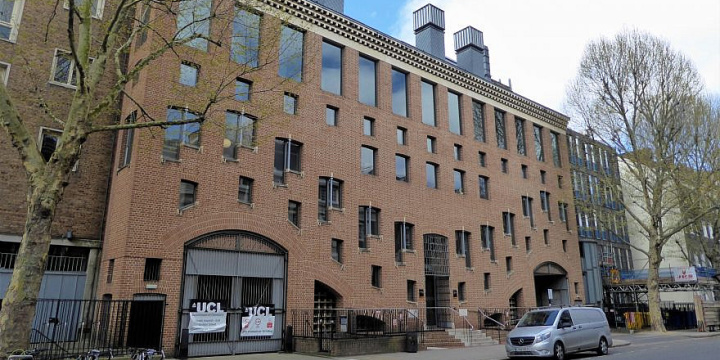Why the IHRA Working Definition of Antisemitism Is Important on Campus
 by Abigail Darwish
by Abigail Darwish

University College London School of Slavonic and East European Studies. Photo: Ethan Doyle White via Wikimedia Commons.
Progressive societies on UK university campuses often pride themselves on championing inclusivity and justice for all ethnic minorities. However, there is undoubtedly a different agenda when it comes to Jews and defining antisemitism.
When it comes to the “debate” over the IHRA working definition of antisemitism — namely the opposition it has received across UK university campuses in spite of its widespread support amongst UK’s Jewish constituents — anti-Zionists object because they claim it impinges on free speech.
But it doesn’t blunt any criticism of Israel. All it does is defend Israel’s right to exist, and protect it from the double standards and hate applied to no other countries.
In February 2021, University College, London (UCL) formally adopted the IHRA definition. Since then, both the UCL Students’ Union and the faculty union (UCU) have made several attempts to scrap the definition (without the consent of the UCL Jewish Society or UCL’s Jewish community). Still, most concerning has been the actions of the UCL Palestine Society (Students for Justice in Palestine), one of the most prominent voices against the IHRA definition. The group dedicates several sections of its Linktree profile to anti-IHRA propaganda.
It is not surprising that this group is also inviting antisemitic, anti-Zionist speakers to campus, and interrupting (including with violence) pro-Israel events.
In 2017, they hosted a speaker who told the audience that ‘Zionists should be treated like Nazis.’” In 2020, when Susan Abulhawa spoke of rejecting dialogue, co-existence, and the very existence of a Jewish state, the Students’ Union promoted a Palestine Society event, “Am I an Anti-Semite?” featuring the staunch anti-Zionist Jewish historian, Ilan Pappe.
These propagandist events demonizing Israel went ahead without challenge.
But when the UCL Friends of Israel Society hosted ex-IDF, LGBTQ+, and Israel advocate Hen Mazzig in 2016, it was met with violent protests and resistance, so much so that the police were called.
Moreover, Students for Justice in Palestine has effectively been able to bash the IHRA for “silencing” students, all while continuing to levy gross criticisms and lies at Israel. Far beyond the realm of any logical, rational criticism of Israel, they have affirmed ridiculous and unfounded claims such as “Zionists have justified their political ambitions on colonialist principles of superiority in culture and knowledge“; “Zionism is a settler-colonial movement”; and much more.
Is it really valid criticism they are so fearful will be silenced?
To me, as a Jewish student, there are two further and equally significant reasons why I care so much about the IHRA working definition, and it being honored by UK universities.
First, it is reassuring to know you are attending an institution where the interests of its Jewish students are considered and respected. Second, as a more general concern, Jews should be treated no differently than any other ethnic minority: so in 2022, it goes without saying that Jews should have the ability to define our experience of Jew-hatred without others attempting to silence us.
Both our UCL Jewish Society and Israel Society do not disclose the locations of our events for security reasons stemming from the aggressive actions of pro-Palestinian protestors. Yet simultaneously, the Palestine Society does not face this dilemma, nor does it face protest or violence on our part.
So, is the IHRA really silencing valid criticism of Israel on campus? I would argue that it is simply ensuring protection and security for our Jewish students. And maybe that’s what our opponents want so desperately to stop.
Abigail Darwish is a first year student at University College, London, and a 2021-2022 Fellow for the Committee for Accuracy in Middle East Reporting & Analysis (CAMERA).
 Police Stop Anti-Zionist Agitators From Accessing Florida University President’s Home as Students Revolt Nationwide
Police Stop Anti-Zionist Agitators From Accessing Florida University President’s Home as Students Revolt Nationwide Nearly One in Five Young People Sympathize With Hamas, 29% Say US Should Reduce or End Alliance With Israel: Poll
Nearly One in Five Young People Sympathize With Hamas, 29% Say US Should Reduce or End Alliance With Israel: Poll Ilhan Omar Silent After Daughter’s Arrest, Suspension for Role in Columbia University Anti-Israel Protest
Ilhan Omar Silent After Daughter’s Arrest, Suspension for Role in Columbia University Anti-Israel Protest Cultural Center Backed by Iran’s Revolutionary Guard Plans to Produce Films About Attack on Israel
Cultural Center Backed by Iran’s Revolutionary Guard Plans to Produce Films About Attack on Israel How Does Ilhan Omar Really Feel About Iran?
How Does Ilhan Omar Really Feel About Iran? This Passover, Combine Respect for Tradition with the Courage to Innovate
This Passover, Combine Respect for Tradition with the Courage to Innovate Israel’s Iran Attack Carefully Calibrated After Internal Splits, US Pressure
Israel’s Iran Attack Carefully Calibrated After Internal Splits, US Pressure Palestinian Cameramen Exposed in New Footage Documenting Oct. 7 Atrocities Side by Side with Terrorists
Palestinian Cameramen Exposed in New Footage Documenting Oct. 7 Atrocities Side by Side with Terrorists US Money to Convicted Terrorists; US Training to Aspiring Terrorists
US Money to Convicted Terrorists; US Training to Aspiring Terrorists Man Arrested in Paris After Iran Consulate Incident
Man Arrested in Paris After Iran Consulate Incident



 US Money to Convicted Terrorists; US Training to Aspiring Terrorists
US Money to Convicted Terrorists; US Training to Aspiring Terrorists Palestinian Cameramen Exposed in New Footage Documenting Oct. 7 Atrocities Side by Side with Terrorists
Palestinian Cameramen Exposed in New Footage Documenting Oct. 7 Atrocities Side by Side with Terrorists Israel’s Iran Attack Carefully Calibrated After Internal Splits, US Pressure
Israel’s Iran Attack Carefully Calibrated After Internal Splits, US Pressure This Passover, Combine Respect for Tradition with the Courage to Innovate
This Passover, Combine Respect for Tradition with the Courage to Innovate How Does Ilhan Omar Really Feel About Iran?
How Does Ilhan Omar Really Feel About Iran?